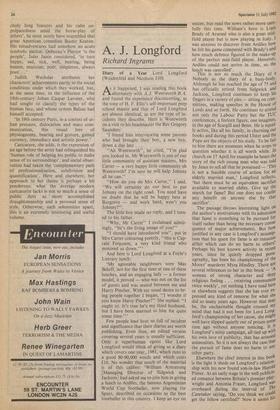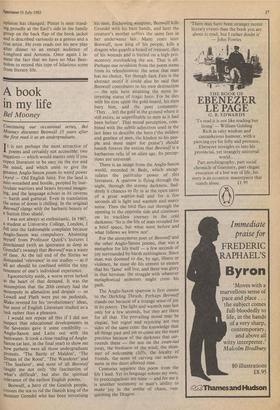A. J. Longford
Richard In grams
Diary of a Year Lord Longford (Weidenfeld and Nicolson £10) Ait happened, I was reading this book alternately with A.J. Wentworth B.A. and found the experience disconcerting, as
the tone of H. F. Ellis's self-important prep school master and that of Lord Longford are almost identical, as are he type of in- cidents they describe. Here is Wentworth on a visit to his headmaster the Rev Gregory Saunders: '1 found him interviewing some parents who had brought their boy, a new boy, down a day late . . .
"Ah Wentworth", he cried, "I'm glad you looked in. Mr Wentworth is one of our little community of assistant masters, Mrs Carter — a very happy little community eh Wentworth? I'm sure he will help Johnny all he can."
"How do you do Mrs Carter," I said. "We will certainly do our best to put Johnny on the right road. You need have no doubt that he will be happy here at Burgrove — and work hard, won't you Johnny?".
The little boy made no reply, and I turn- ed to his father.
"Why, Mr Carter" I exclaimed admir- ingly, "he's the living image of you!"
"I should have introduced you", put in Mrs Carter colouring prettily, "this is Cap- tain Ferguson, a very kind friend who motored us down."' And here is Lord Longford at a Foyle's Literary lunch: 'My agreeable neighbours were Max Beloff, not for the first time at one of these lunches, and an engaging lady — a former model, it proved — who was not on the list of guests and was seated between me and Harry Pincher. With my usual desire to br- ing people together I began, "I wonder if you know Harry Pincher?" She replied: "I ought to. It's true he's my third husband, but I have been married to him for quite some time." ' Few people lead lives so full of incident and significance that their diaries are worth publishing. Even then, an edited version covering several years is usually sufficient. Only a. superhuman egoist like Lord Longford would think of giving us a diary which 'covers one year, 1981, which runs to a good 80-90,000 words and which costs £.10. No wonder that much of the material is of this calibre: 'William Armstrong [Managing Director of Sidgwick and Jackson] had asked me to join him in giving a lunch to Ardiles, the famous Argentinian World Cup footballer, now playing for Spurs, described on occasions as the best footballer in this country. I keep an eye on
soccer, but read the news rather more care- fully this time. William's hero is Liam Brady of Arsenal who is also a great mid- field player but is now playing in Italy. I was anxious to discover from Ardiles how he felt his game compared with Brady's and how much defence figured in the make-UP of the perfect mid-field player. However, Ardiles could not arrive in time, so the lunch was cancelled'. This is not so much the Diary of a Nobody as the diary of a busy-bodY. Although he has reached the age of 75 and has officially retired from Sidgwick and Jackson, Longford continues to keep his fingers in a variety of pies — sitting on com- mittees, making speeches in the House of Lords and so forth. He continues to attend not only the Labour Party but the TUC conferences, a forlorn figure, one imagines, in the age of Scargill and Benn. He is equal- ly active, like all his family, in churning out books and during this period Ulster and the Pope are the objects of his study. To be fair to him there are moments when he stops to question whether it is all worth while. In church on 17 April for example he hears the story of the rich young man who was told by Jesus to sell all that he possessed — 'This is not a feasible course of action for an elderly married man,' Longford reflects, 'but there must be an equivalent sacrifice available to married oldies. Give up the search for fame? But one does not confer any benefit on anyone else by that sacrifice'.
The passage throws interesting light on the author's motivations with its admission that fame is something to be pursued for itself rather than being the necessary conse- quence of major achievements. But how justified in any case is Longford's assurnP- tion that his quest for fame is an innocent affair which can do no harm to others? Perhaps his best known activity in recent years, since he quietly dropped porn- ography, has been his championing of the Moors' murderer Myra Hindley. There are several references to her in this book — woman of strong character and deep religious feeling . . . receiving communion twice weekly', yet nothing I have read here or elsewhere suggests that she has ever ex- pressed any kind of remorse for what she did so many years ago. However that may be, the uncharitable thought crossed triY mind that had it not been for Lord Long- ford's championing of her cause, she Might well have slipped quietly out of prison soMe time ago without anyone noticing. It. Is Longford's noisy campaign, all tied up with his own love of publicity, that has aroused animosities. So it is not always the case that the pursuit of fame does no harm to anY other party. Elsewhere the chief interest in this book is the light it sheds on Longford's relation- ship with his new found son-in-law Harold Pinter. At an early stage in the well publicis- ed romance between Britain's premier PlaY- wright and Antonia Fraser, Longford was overheard during the interval of 711,e Caretaker saying, `Do you think we cold,' get the fellow certified?' Now it seems his
opinion has changed. Pinter is seen stand- ing proudly at the Earl's side in the family group on the back flap of the book jacket and is described variously as a genius and a true artist. He even reads out his new play after dinner to an enrapt audience of Longford and Antonia. Once again I la- ment the fact that we have no Max Beer- bohm to record this type of hilarious scene from literary life.







































 Previous page
Previous page